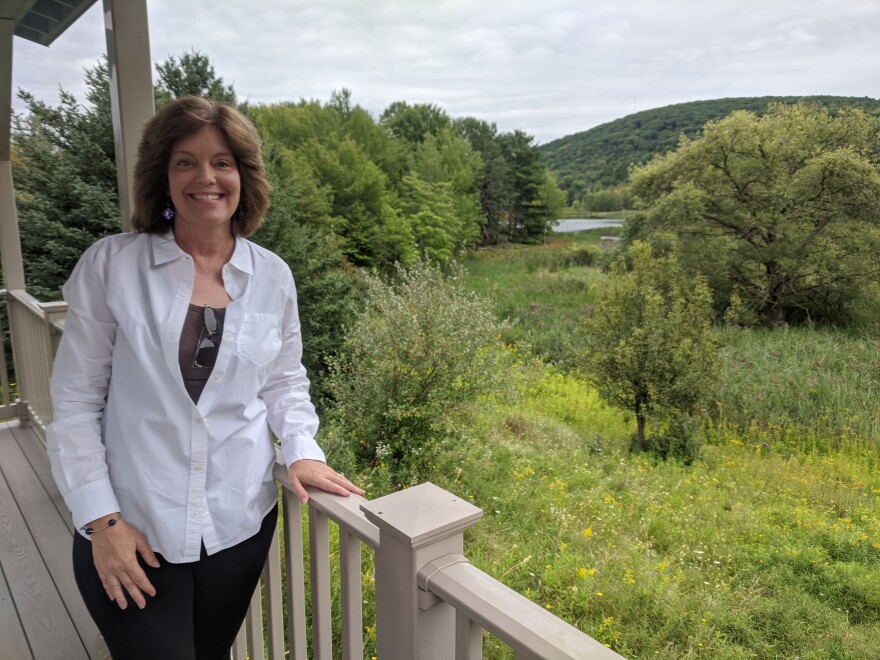Updated: 11/13/20 – 1:45 P.M.
BINGHAMTON, NY (WSKG) — Most mothers start to bond with their child before they are born, and it is normal and healthy to continue bonding after they have died.
Molly Santa Croce’s daughter, Megan, died from ovarian cancer in 2018.
"It’s like an amputation."
Megan was a virtuous young woman who showed respect and kindness to everyone she met. Her mother describes her as full of joy, optimism, and courage.
"She had a radiance that sort of emanated from her," Santa Croce said.
Megan fought for 17 months. When she died, Santa Croce said it was like an amputation. She spent some days in silence or in bed. It's something she wishes people would understand about their friends in grief.
Silent support is sometimes all that is needed. Laura Ward, a bereavement counselor with Hospicare, encourages people to give opportunities for friends to express their grief and then listen. Reach out but avoid platitudes, be genuine.* For instance, it is not easier to say goodbye to someone just because their illness was drawn-out and terminal, and grieving a child is not easier because someone has other kids. Although, Santa Croce said that did keep her going.
"You kinda just have to go on autopilot, especially if you have other children to take care of," Santa Croce said. "You do just kinda have to sit up in bed and put your feet on the floor, start walking, and put the coffee on."
#LiveLikeMegan
"I think you can move forward in your life with it," Santa Croce said. "It doesn’t ever really ever go away but your life can kind of grow around it."
When a parent loses a child, they also lose all the hopes they held for that child’s future. Ward, with Hospicare, said often parents will do things to keep that child's memory alive.
"[It's] to continue to make their life matter, have mattered," Ward said. "The parent is who carries that the most, from the beginning and after the person dies."
That's what Santa Croce is doing now, with the #LiveLikeMegan hashtag on Instagram, trees planted in Megan’s honor and providing flowers to her church. There is a blood drive on Nov. 21 at the Broome County Cornell Cooperative Extension on Front Street in Binghamton, and a scholarship fund was established two years ago for seniors at Chenango Valley High School as per Megan's final wishes.
It doesn't ever go away.
Ward said a loss only two years old is still fresh.
"Sometimes the second year is harder. Two years is nothing in the frame of grief," explained Ward.
Grief from losing a child is profound in terms of the amount of grief and the length of the grieving period. Some parents in a Hospicare group have been a part of that for 10 years, Ward said, because it does not really ever go away.
Traditional theories on grief suggest a person moves through it, ultimately achieving acceptance. In the book Continuing Bonds: New Understandings of Grief, the authors present the idea that our relationship to a person can continue even after they have died. Grief doesn’t end, but feels different over time.
"Whereas society often thinks it's pathological to hold on to some degree," Ward added.
She said there can be times when the grief does start to impede a person's life, when they are not engaging in life.
"But, for the most part, this continuing connection with a person throughout life is really normal and healthy," Ward said.
Ward once met a woman who wore a pin with her daughter's picture every day. It prompted people to engage with her about her loss and opened an opportunity for her to talk about her daughter. Continuing bonds, however, can be as simple as seeing a movie you just know they would have enjoyed. It's making personal moments that you share with that person who has passed.
Santa Croce said she intends to normalize her loss.
"I will need to incorporate my feelings of sadness and loss in my life moving forward, and that’s okay. That's okay, and that doesn’t mean I can’t feel joy or happiness, or make good memories with friends and family," Santa Croce said.
Through all of those moments, she said, her grief will always be there.
*An earlier version indicated silence would be better than saying something insensitive. According to Ward, that is the reason people often do not reach out. She said, "The problem is that many people try to say things that will make it better and it’s not something that can be made better."





